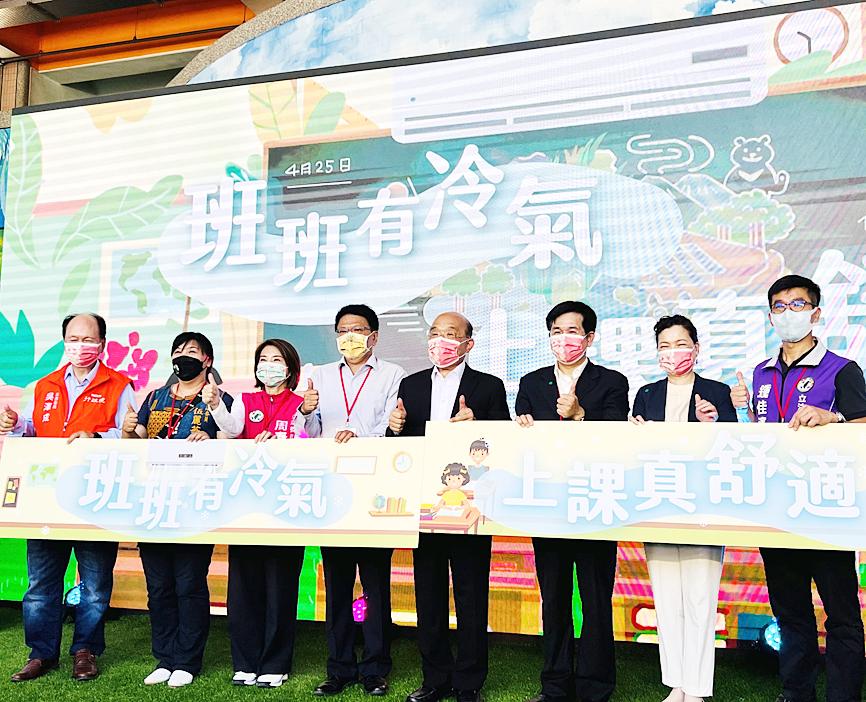Students will be able to study in comfort this summer, after air-conditioners were installed in public schools nationwide in a government initiative more than a year in the making.
Premier Su Tseng-chang (蘇貞昌) at a launch event yesterday hailed the initiative as achieving “mission impossible.”
Teachers and students have long been plagued by high temperatures, affecting their studies and necessitating a concerted plan of action, Su told a gathering at Pingtung City’s Heh Sheng Elementary School, which was joined virtually by schools nationwide.

Photo: CNA
The Cabinet’s plan took more than a year to coordinate, with 2,300 work crews installing 180,000 air-conditioners in 3,500 schools nationwide, he said.
“After overcoming all sorts of hardships and limitations, we have achieved ‘mission impossible’ so that students no longer have to sit in class covered in sweat,” Su said.
It is only April and already Pingtung City is experiencing temperatures exceeding 32°C, Su said.
“You can imagine what the afternoon temperatures will be like over the next two months,” he said.
People have been trying to fix the problem for decades, but the costs and challenges have made the task monumental, he said.
The government has coordinated between schools, Taiwan Power Co (台電) and manufacturers to finally install air-conditioners in every classroom in the nation, he added, thanking everyone involved for their hard work.
A total budget of NT$35.79 billion (US$1.22 billion) went into the initiative, NT$32.3 billion of which was provided by the central government, with the rest contributed by local governments, Minister of Education Pan Wen-chung (潘文忠) said, adding that all electricity and maintenance costs would be borne by the central government.

AGING: As of last month, people aged 65 or older accounted for 20.06 percent of the total population and the number of couples who got married fell by 18,685 from 2024 Taiwan has surpassed South Korea as the country least willing to have children, with an annual crude birthrate of 4.62 per 1,000 people, Ministry of the Interior data showed yesterday. The nation was previously ranked the second-lowest country in terms of total fertility rate, or the average number of children a woman has in her lifetime. However, South Korea’s fertility rate began to recover from 2023, with total fertility rate rising from 0.72 and estimated to reach 0.82 to 0.85 by last year, and the crude birthrate projected at 6.7 per 1,000 people. Japan’s crude birthrate was projected to fall below six,

Conflict with Taiwan could leave China with “massive economic disruption, catastrophic military losses, significant social unrest, and devastating sanctions,” a US think tank said in a report released on Monday. The German Marshall Fund released a report titled If China Attacks Taiwan: The Consequences for China of “Minor Conflict” and “Major War” Scenarios. The report details the “massive” economic, military, social and international costs to China in the event of a minor conflict or major war with Taiwan, estimating that the Chinese People’s Liberation Army (PLA) could sustain losses of more than half of its active-duty ground forces, including 100,000 troops. Understanding Chinese

US President Donald Trump in an interview with the New York Times published on Thursday said that “it’s up to” Chinese President Xi Jinping (習近平) what China does on Taiwan, but that he would be “very unhappy” with a change in the “status quo.” “He [Xi] considers it to be a part of China, and that’s up to him what he’s going to be doing, but I’ve expressed to him that I would be very unhappy if he did that, and I don’t think he’ll do that. I hope he doesn’t do that,” Trump said. Trump made the comments in the context

SELF-DEFENSE: Tokyo has accelerated its spending goal and its defense minister said the nation needs to discuss whether it should develop nuclear-powered submarines China is ramping up objections to what it sees as Japan’s desire to acquire nuclear weapons, despite Tokyo’s longstanding renunciation of such arms, deepening another fissure in the two neighbors’ increasingly tense ties. In what appears to be a concerted effort, China’s foreign and defense ministries issued statements on Thursday condemning alleged remilitarism efforts by Tokyo. The remarks came as two of the country’s top think tanks jointly issued a 29-page report framing actions by “right-wing forces” in Japan as posing a “serious threat” to world peace. While that report did not define “right-wing forces,” the Chinese Ministry of Foreign Affairs was